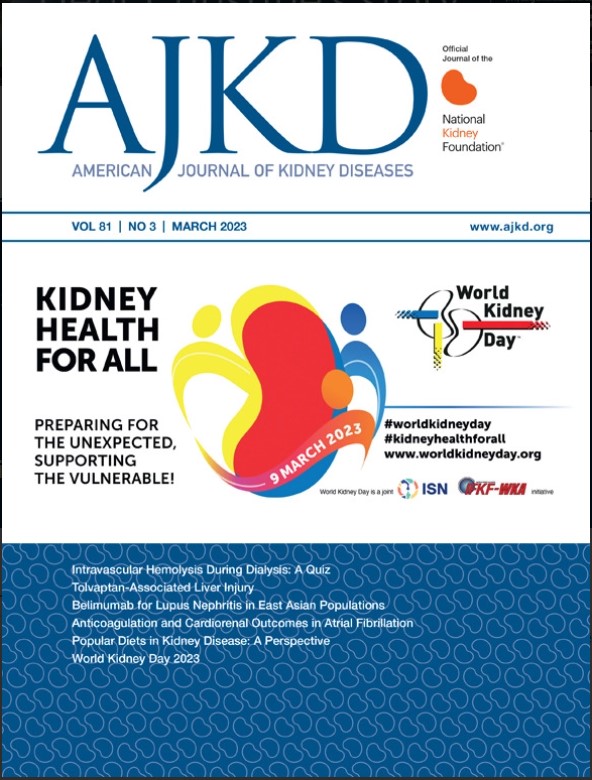Contraceptive Use and Reproductive Health in Women With CKD: A Qualitative Study Of Nephrologists in the United States.
IF 8.2
1区 医学
Q1 UROLOGY & NEPHROLOGY
引用次数: 0
Abstract
RATIONALE & OBJECTIVE Women with chronic kidney disease (CKD) face elevated risks during pregnancy, yet contraceptive use and reproductive health counseling remain low. Nephrologists, who often maintain longitudinal relationships with patients, may be well-positioned to engage in these discussions. This study aimed to explore nephrologists' perspectives on contraception and reproductive health management in women with CKD. STUDY DESIGN Qualitative study using semi-structured interviews. SETTING & PARTICIPANTS Interviews were conducted with 25 adult general and transplant nephrologists from both academic and private practice settings across the United States. ANALYTICAL APPROACH Virtual interviews were recorded, transcribed, and analyzed using thematic analysis until thematic saturation was achieved. A grounded theory approach guided coding and identification of key themes related to provider experiences and perspectives. RESULTS The following four themes and their respective subthemes were identified: (1) physician discomfort regarding discussion of contraception and reproductive health (reliance on patient initiation, hesitation with counseling, uncertainty about scope of practice); (2) insufficient training and inadequate guidelines regarding contraception and reproductive health (paucity of formal guidelines, limited exposure, reliance on self-education); (3) lack of interdisciplinary coordination regarding contraceptive use and reproductive health (the patient as an intermediary, fragmentation of care); (4) need for holistic and patient-centered care (comprehensive and sustained approach, shared decision-making). LIMITATIONS Generalizability may be limited due to participants being predominantly early-career academic nephrologists. CONCLUSIONS Key barriers to contraceptive use and management of reproductive health for women with CKD include provider discomfort due to limited exposure and training, lack of clear guidelines, and fragmented care. Despite these challenges, providers recognize the importance of holistic, patient-centered care. These findings highlight the need to improve contraceptive counseling to support appropriate contraceptive use and shared decision-making for the reproductive health of patients with kidney disease.慢性肾病妇女的避孕使用和生殖健康:美国肾病学家的定性研究。
理由与目的慢性肾脏疾病(CKD)妇女在怀孕期间面临较高的风险,但避孕药具的使用和生殖健康咨询仍然很低。经常与患者保持纵向关系的肾病学家可能会很好地参与这些讨论。本研究旨在探讨肾病学家对CKD妇女避孕和生殖健康管理的看法。研究设计采用半结构化访谈进行定性研究。环境和参与者访谈了来自美国各地学术和私人执业环境的25名成年全科和移植肾病学家。分析方法虚拟访谈被记录、转录,并使用专题分析进行分析,直到专题饱和。基于理论的方法指导编码和识别与提供者经验和观点相关的关键主题。结果确定了以下四个主题及其子主题:(1)医生对避孕与生殖健康讨论的不适(依赖患者发起、咨询犹豫、不确定实践范围);(2)关于避孕和生殖健康的培训和指导方针不足(缺乏正式指导方针,接触有限,依赖自学);(3)在避孕药具使用和生殖健康方面缺乏跨学科协调(以病人为中介,护理分散);(4)以患者为中心的整体护理需求(全面、持续、共同决策)。局限性:由于参与者主要是早期职业的学术肾病学家,通用性可能受到限制。结论:慢性肾病妇女避孕药具使用和生殖健康管理的主要障碍包括由于接触和培训有限导致的提供者不适,缺乏明确的指导方针,以及分散的护理。尽管存在这些挑战,提供者认识到整体的重要性,以病人为中心的护理。这些发现强调需要改善避孕咨询,以支持适当的避孕使用和共同决策的肾脏疾病患者的生殖健康。
本文章由计算机程序翻译,如有差异,请以英文原文为准。
求助全文
约1分钟内获得全文
求助全文
来源期刊

American Journal of Kidney Diseases
医学-泌尿学与肾脏学
CiteScore
20.40
自引率
2.30%
发文量
732
审稿时长
3-8 weeks
期刊介绍:
The American Journal of Kidney Diseases (AJKD), the National Kidney Foundation's official journal, is globally recognized for its leadership in clinical nephrology content. Monthly, AJKD publishes original investigations on kidney diseases, hypertension, dialysis therapies, and kidney transplantation. Rigorous peer-review, statistical scrutiny, and a structured format characterize the publication process. Each issue includes case reports unveiling new diseases and potential therapeutic strategies.
 求助内容:
求助内容: 应助结果提醒方式:
应助结果提醒方式:


